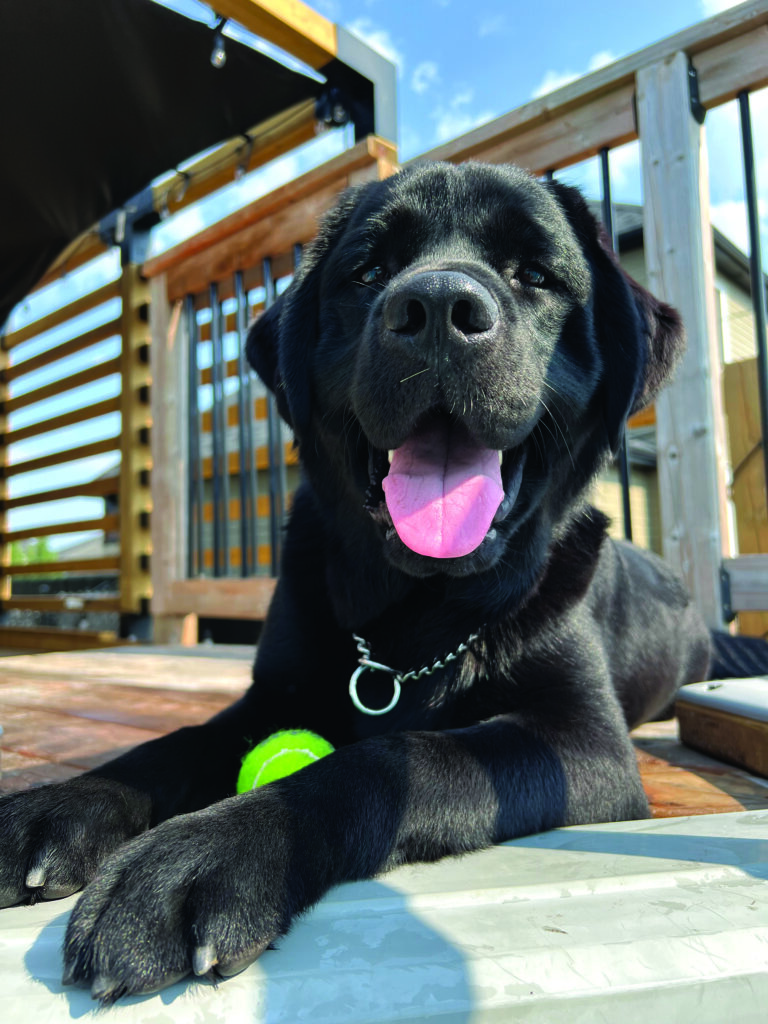By Matthew Daldalian – Local Journalism Initiative Reporter
Two years after his arrival, an assistance dog named Mac is being credited with helping hundreds of children navigate some of the most difficult moments of their lives in Laval’s youth protection system.
The Centre Intégré de Santé et de Services Sociaux (CISSS) de Laval says the furry companion, trained by the MIRA Foundation, has taken part in more than 300 interventions since 2023. The dog works alongside criminologist Daphnée Morency Mac Donald at the Direction de la Protection de la Jeunesse (DPJ).
Officials describe Mac’s presence as a way to reduce anxiety and build trust when children face interviews, court proceedings or emotionally charged announcements. “Mac acts as a bridge between the child and the caregiver. He reduces anxiety, eases tension, and opens the way to authentic exchanges in moments when speaking is sometimes difficult.,” Mac Donald said in a CISSS presse release.
Frontline role
In an interview with The Laval News, Mac Donald noted that Mac’s role is specific to youth protection interventions. “There really is a nuance,” she said.
That can mean accompanying a child during a police video interview, sitting quietly at their side in court, or simply being present during the delivery of difficult news such as a foster placement or the death of a parent.

“It doesn’t necessarily make the task easier, but it does make it more calming for the child because of the dog’s presence,” Mac Donald said.
She noted that children also interact with Mac during less formal moments, such as waiting for appointments or during supervised visits. Sometimes they simply play with Mac in the corridor, giving them what she described as “a more normal time.”
Concrete impact
Mac Donald recalled cases where Mac’s presence shifted the outcome. In one file, a teenage girl requested the dog’s support at multiple steps of her journey, from youth protection meetings to appointments with a psychiatrist.
“Mac brought some comfort in what was coming for her,” Mac Donald said.
Another case involved a child with selective mutism who had not spoken during earlier interventions. With Mac in the room, she said, the child began to verbalize. “Once the dog was there, we saw that the process was moving forward.”
According to Mac Donald, colleagues in other units also requested the dog’s support for their cases, with his growing reputation inside the DPJ.
A steady companion
Mac Donald noted that part of Mac’s effectiveness comes from his ability to remain calm and available for long periods “except when there are moments when he can allow himself not to.” She credits this tendency to switch between modes to his effectiveness in dealing with children.
The CISSS said the project was made possible with funding from the Fondation Cité de la Santé. Jean-François Payette, director of youth protection in Laval, called it a hopeful example of innovation in social services. “This assessment is a source of hope. It shows that innovation in health and social services can take unexpected, but profoundly effective forms,” she said.
Broader context
The CISSS de Laval employs more than 13,000 people across over 30 facilities, including the Hôpital de la Cité-de-la-Santé and several youth and rehabilitation centres. Affiliated with Université de Montréal and McGill University, it has positioned Mac as part of a larger push to test human-centred approaches.
For Mac Donald, the results speak for themselves. From quiet companionship in a courtroom to playful moments in a hallway, she said, the dog has become a steady presence for children facing upheaval.



